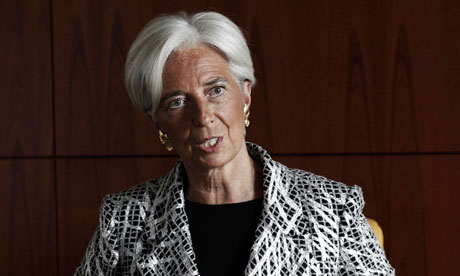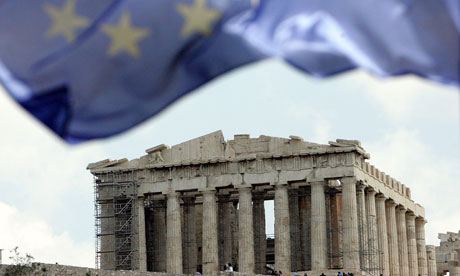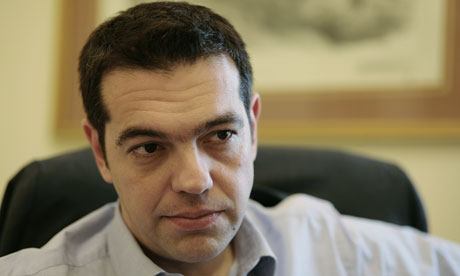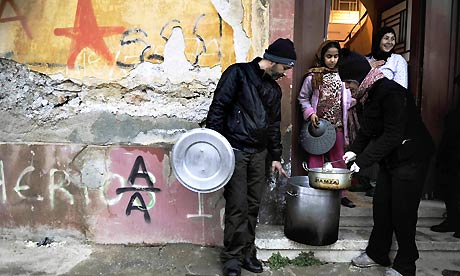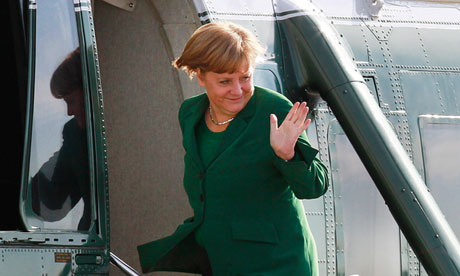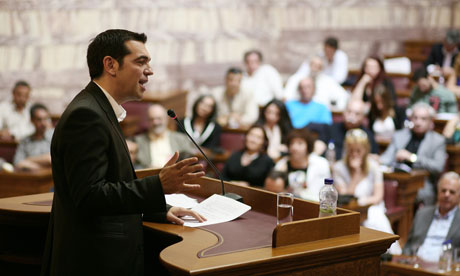Greece's eurozone fate may now be in the hands of the 37-year-old political firebrand and his Syriza party

Alexis Tsipras in his office at the Greek parliament building on Friday. He says Greece has been used as a guinea pig for the rest of Europe. Photograph: Martin Godwin
"I don't believe in heroes or saviours," says Alexis Tsipras, "but I do believe in fighting for rights … no one has the right to reduce a proud people to such a state of wretchedness and indignity."
The man who holds the fate of the euro in his hands – as the leader of the Greek party willing to tear up the country's €130bn (£100bn) bailout agreement – says Greece is on the frontline of a war that is engulfing Europe.
A long bombardment of "neo-liberal shock" – draconian tax rises and remorseless spending cuts – has left immense collateral damage. "We have never been in such a bad place," he says, sleeves rolled up, staring hard into the middle distance, from behind the desk that he shares in his small parliamentary office. "After two and a half years of catastrophe Greeks, are on their knees. The social state has collapsed, one in two youngsters is out of work, there are people leaving en masse, the climate psychologically is one of pessimism, depression, mass suicides."
But while exhausted and battle weary, the nation at the forefront of Europe's escalating debt crisis and teetering on the edge of bankruptcy is also hardened. And, increasingly, they are looking towards Tsipras to lead their fight.
"Defeat is the battle that isn't waged," says the young politician who almost overnight has seen his radical left coalition party, Syriza, jump from representing fewer than 5% of Greeks to enjoying ratings of more than 25% in polls.
"You ask me if I am afraid. I'd be afraid if we continued on this path, a path to social hell … when someone fights there is a big chance that he will win and we are fighting this to win."
Before Greeks went to the polls on 6 May, neither Tsipras nor his party were a name to be reckoned with. If anything both were the butt of vague mockery: a former pony-tailed student communist leading a rag-tag band of ex-Trotskyists, Maoists, champagne socialists and greens. Tsipras's assistants – wielding Louis Vuitton bags and fashionable sunglasses – readily admit they are signed up "militants" mostly of the anti-globalisation cause.
But today I am the third person to pass through Tsipras's second-floor parliamentary office. The others have been the German ambassador to Greece and the president of the European parliament, Martin Schulz. As Greeks prepare to head to the polls again on 17 June, Tsipras, the politician poised to win the greatest number of votes – after Syriza came in second place in this month's inconclusive election – is the man everyone wants to see. "He is not as dangerous as he appears on TV, but he does have some risky positions," says Schulz emerging form the talks.
"The [upcoming] vote in Greece will decide not just what happens here but what will happen internationally", adds the German before saying what he really wants to say. "If the memorandum [loan agreement] is cast in doubt, the payment [of rescue funds from the EU and IMF] to Greece is cast in doubt."
Tsipras, who turns 38 in July, wants me to know that the war is not personal. The enemy is not Berlin, until now the biggest provider of the monumental rescue funds keeping the debt-stricken economy afloat. "It is not between nations and peoples," he says. "On the one side there are workers and a majority of people and on the other are global capitalists, bankers, profiteers on stock exchanges, the big funds. It's a war between peoples and capitalism … and as in each war what happens on the frontline defines the battle. It will be decisive for the war elsewhere."
Greece, he says, has become a model for the rest of Europe because it was the first country to fall victim to the enforcement of hard-hitting "growth through austerity" policies pursued in the name of resolving the crisis.
"It was chosen as the experiment for the enforcement of neo-liberal shock [policies] and Greek people were the guinea pigs," he insists.
"If the experiment continues, it will be considered successful and the policies will be applied in other countries. That's why it is so important to stop the experiment. It will not just be a victory for Greece but for all of Europe."
Under the current rescue plan, which has subjected the nation to relentless austerity – the average Greek's purchasing power has dropped by 35% – the international financial system, and especially banks, are gaining most, he says. "Who is surviving, tell me?" he asks. "Greeks aren't … The loans are going straight to interest payment and banks."
The other point that Tsipras wants to make is that he is not against the euro or monetary union. Fears that the country is about to exit the eurozone are about terrorising people to keep the status quo, he claims. They are why the nation has seen "more then €75bn" of cash taken out of Greek banks since the outbreak of the crisis in Athens in December 2009.
But Angela Merkel, the German chancellor, should know she has "a huge historical responsibility" – a point he will be making when he holds talks with representatives of the German government in Berlin next week.
"We are not against a unified Europe or monetary union," he insists. "We don't want to blackmail, we want to persuade our European partners that the way that has been chosen to confront Greece is totally counter-productive. It is like throwing money at a bottomless pit."
Over the past two years, Athens had received two bumper bailouts from the EU and IMF: €110bn in May 2010 and then €130bn in March this year, but the stringent fiscal adjustment programmes demanded in return for the aid are clearly not working, he says.
If the emphasis is not now put on re-energising Europe's most moribund economy through development and growth, "in six months we will be forced to discuss a third package and after that a fourth," he predicts,
"European tax payers should know that if they are giving money to Greece, it should have an effect … it should go towards investments and underwriting growth so that the Greek debt problem can be confronted because with this recipe we are not confronting the debt problem, the real issue."
All this sounds remarkably toned down from the fiery rhetoric Tsipras has come to be associated with – until, that is, the mention of rescue funds drying up if (as seems likely) his party emerges as the governing force in a hung parliament.
The first thing Syriza will do in power is tear up the controversial "memorandum of understanding" Greece signed up to with creditors, which details the onerous conditions under which the country receives quarterly injections of cash.
The agreement, he says, was reached without the Greek people ever being consulted. And now in the wake of the 6 May vote, when more than 70% of those opposing the policies voted for "anti-bailout" parties, it is clear it has lost all legitimacy, he insists
It is a high stakes game but, he argues, Europe is holding the gun because ultimately, under European law, Greece can't be ejected from the 17-nation bloc.
"Europeans have to understand that we don't have any intention of pushing ahead with a unilateral move. We will [only] be forced to act if they act unilaterally and make the first move," he says. "If they don't pay us, if they stop the financing [of loans] then we will not be able to pay creditors. What I am saying is very simple."
And if Athens stops paying its creditors, the problem then takes on a different hue. Greece is in a much stronger position than most think.
"Keynes said it many years ago. It's not just the person who borrows but the person who lends who can find himself in a difficult position. If you owe £5,000 to the bank, it's your problem but if you owe £500,000, it's the bank's problem," he said. "This is a common problem. It's our problem. Its Merkel's problem. It's a European problem. Its a world problem."
With his good looks, raven black hair and propensity for rousing oratory, Tsipras comes across more as a pin-up (which is how many in Greece see him) than a saviour, which is how a great deal of others see him.
His aides add in passing that one of his heroes is Venezuelan leader Hugo Chávez, with whom he shares the same birthday. Nor does he believe in political tags "at this time of crisis".
But though he appears to be preparing for power and moderating his tone, he says the war will continue.

![The [Greek] European Tragedy](https://blogger.googleusercontent.com/img/b/R29vZ2xl/AVvXsEiWKI5s90SFm1wWTk6bs4p7CgslaC2SnYPsrZhb-B-smOufNNCSxCvpBLI9hOB-LsXZjir_PNmEiMk2-E62F3xkg96IoC6QFAaZAnPRTVH340IN9WBRmWJqPkjWlgyRj3zpALp7h6hvA58/s920/GkBack_new.jpg)



